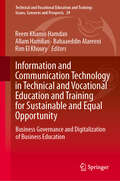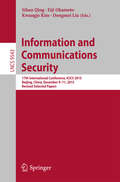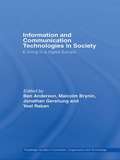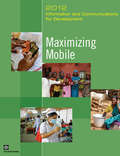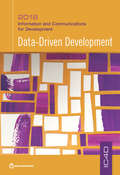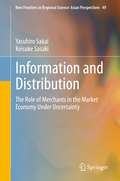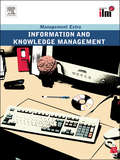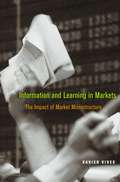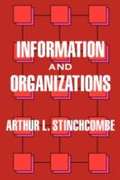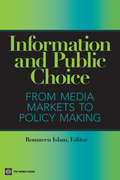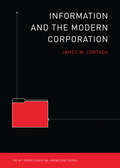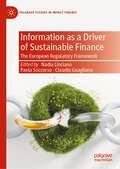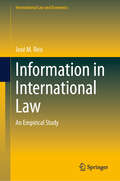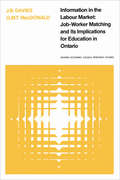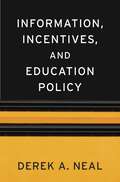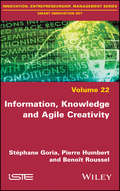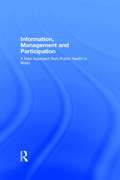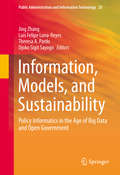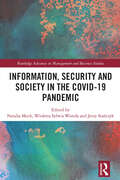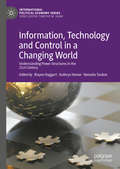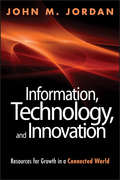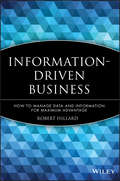- Table View
- List View
Information and Communication Technology in Technical and Vocational Education and Training for Sustainable and Equal Opportunity: Business Governance and Digitalization of Business Education (Technical and Vocational Education and Training: Issues, Concerns and Prospects #39)
by Allam Hamdan Bahaaeddin Alareeni Reem Khamis Hamdan Rim El KhouryThis book provides an in-depth analysis of current development concerning ICTs with reference to vocational education and training. It presents the best and innovative ICT-based solutions implemented in education and explores controversial topics such as challenges and opportunities. Information and communication technologies (ICTs) have dramatically changed the way we learn and work. They have created new opportunities along with new challenges, putting profound and urgent implications on vocational education and training (VET). Nowadays, we must think broadly and make the right choices about VET using innovation and digitalization to boost the quality of vocational education and training, enable the upskilling and reskilling of adults, and enhance the employability of learners. The potential and the impact of ICTs in vocational education and training have yet to be fully exploited, leading to an emerging direction of research. This book helps readers to understand the idea of business education and education governance in a digital age. It is of interest to practitioners, administrators, researchers, teachers, teacher educators and students.
Information and Communications Security: 17th International Conference, ICICS 2015, Beijing, China, December 9-11, 2015, Revised Selected Papers (Lecture Notes in Computer Science #9543)
by Sihan Qing Eiji Okamoto Kwangjo Kim Dongmei LiuThis book constitutes the thoroughly refereed post-conference proceedings of the 17th International Conference on Information and Communications Security, ICISC 2015, held in Beijing, China, in December 2015.The 24 revised full papers and 19 short papers presented were carefully selected from 148 submissions. The papers provide the latest results in research and development in the field of information security and applied cryptology.
Information and Communications Technologies in Society: E-Living in a Digital Europe (Routledge Studies in Innovation, Organizations and Technology)
by Ben Anderson Malcolm Brynin Jonathan Gershung Yoel RabanThere is a growing body of work examining the ‘consequences’, or more accurately the inter-relationships between information and communications technologies (ICTs) and society at the microsocial (individual, household) level. The vast majority of this work has so far been focused on the US and the subsequent publications have consequently provided predominantly US-centred analyses. This book will re-dress this balance by providing analyses of the situation in Europe and is associated states and placing the analyses in the context of both European and International research and policy debates. The book uses data from a range of European countries as well as comparisons with Asia and the USA. Students and academics from a range of disciplines including sociology, business and management and new media will find this book to be a valuable addition to their reading lists.
Information and Communications for Development 2012
by World Bank StaffWith some six billion mobile subscriptions now in use worldwide, around three-quarters of the world's inhabitants now have access to a mobile phone. Mobiles are arguably the most ubiquitous modern technology - in some developing countries, more people have access to a mobile phone than to clean water, a bank account or even electricity. Mobile communications now offer major opportunities to advance human development - from providing basic access to education or health information to making cash payments and stimulating citizen involvement in democratic processes. This 2012 edition of the World Bank's Information and Communication for Development Report analyses the growth and evolution of mobile telephony, and the rise of data-based services delivered to handheld devices, including 'apps' or smartphone applications. The report explores the consequences for development of the emerging 'app economy'. It summarises current thinking and seeks to inform the debate on the use of mobile phones for development. This report looks, in particular, at key ecosystem-based applications in agriculture, health, financial services, employment and government, with chapters devoted to each. It's no longer about the phone itself, but about how it is used, and the content and applications that mobile phones open up. Mobile applications not only empower individual users, they enrich their lifestyles and livelihoods, and boost the economy as a whole. Mobile apps make phones immensely powerful as portals to the online world. A new wave of apps and 'mash-ups' of services, driven by high-speed networks, social networking, online crowdsourcing and innovation, is helping mobile phones transform the lives of people in developed and developing countries alike. The report finds that mobile applications not only empower individuals, but have important cascade effects stimulating growth, entrepreneurship and productivity throughout the economy as a whole. Mobile communications promise to do more than just give the developing world a voice - they unlock the genie in the phone, empowering people to make their own choices and decisions.
Information and Communications for Development 2018: Data-Driven Development (Information and Communications for Development)
by World BankThe Information and Communications for Development series looks in depth at how information and communications technologies are affecting economic growth in developing countries. This new report, the fourth in the series, examines the topic of data-driven development, or how better information makes for better policies. The objective is to assist developing-country firms and governments in unlocking the value of the data they hold for better service delivery and decision making and to empower individuals to take more control of their personal data. We are undoubtedly experiencing a data revolution in which our ability to generate, process, and utilize information has been magnified many times over by the machines that we increasingly rely upon. This report is about how the data revolution is changing the behavior of governments, individuals, and firms and how these changes affect the nature of development: economic, social, and cultural. How can governments extract value from data to improve service delivery in the same way that private companies have learned to do for profit? Is it feasible for individuals to take ownership of their own data and to use it to improve their livelihoods and quality of life? Can developing-country firms compete with the internet majors on their own turf and be even more innovative in their use of data to serve local customers better? Though the report is aimed primarily at government policy makers, it also has great relevance for individuals concerned about how their personal data is used and how the data revolution might affect their future job prospects. For private sector firms, particularly those in developing countries, the report suggests how they might expand their markets and improve their competitive edge. For development professionals, the report provides guidance on how they might use data more creatively to tackle long-standing global challenges, such as eliminating extreme poverty, promoting shared prosperity, or mitigating the effects of climate change. The report’s chapters explore different themes associated with the supply of data, the technology underlying it, and the demand for it. An overview chapter focuses on government use of data and presentation of definitions. Part I of the report then looks at the “supply side†? of the data sector, with chapters on data connectivity and capacity (where data comes from, how it is stored, and where it goes) and data technology (specifically big data analytics and artificial intelligence) and how this is contributing to development. Part II looks at the sector’s “demand side,†? with a chapter on people’s use of data and another that examines how firms use digital platforms in the data economy and how that contributes to competitiveness. Part III brings together the policy implications for developing-country stakeholders, with a chapter considering government policies for data, including data protection and privacy. A closing Data Notes appendix looks at statistical indicators associated with the use of data and presents the 2018 update of the Digital Adoption Index (DAI), a composite indicator introduced in the 2016 World Development Report: Digital Dividends.
Information and Distribution: The Role of Merchants in the Market Economy Under Uncertainty (New Frontiers in Regional Science: Asian Perspectives #49)
by Yasuhiro Sakai Keisuke SasakiThe purpose of this book is to discuss the relationship between information and distribution, with special reference to the role of the merchant in a market economy under conditions of risk and uncertainty. By working with simple models of the market economy and conducting a sequence of comparative analyses, the authors shed new light on an important yet rather neglected area in economics. In a historical perspective, the merchants of Ohmi, the former name of Shiga Prefecture in western Japan, are known to have put great faith in the principles of Sampo Yoshi or the all-around advantages of trading. It is hoped that the results presented in this book will provide some solid ground for such an old principle that can be seen in a new light. Applications to regional and many related problems are also discussed here. A distribution system is broadly defined as the systematic mechanisms and structures that regulate business operations, and its function is to maximize corporate value. Some of the following functions have previously been identified as distinguishing features of the Japanese distribution system compared with distribution systems in Europe and the United States: not only transactions, transportation, and storage, but also information, risk-bearing functions, and other characteristics. This book provides an overview of the distribution system in Japan, including changes that its practice have undergone and its current state; identifies current problems; and considers how these problems should be addressed.
Information and Knowledge Management Revised Edition: Revised Edition (Management Extra Ser.)
by ElearnStuck for ideas, inspiration or just want to work differently? Management Extra brings all the best management thinking together in one package. The books are practical and well structured to provide an in depth treatment of these management topics. Titles in the series: * Business Environment * Change Management * Development for High Performance * Effective Communications * Financial Management * Information and Knowledge Management * Leadership and Management in Organisations * Leading Teams * Making Sense of Data and Information * Managing Markets and Customers * Managing for Results * Managing Health, Safety and Working Environment * Managing Legal and Ethical Principles * Managing Yourself * Positive Working Relationships * Project Management * Quality and Operations Management * Reaching Your Goals Through Innovation * Recruitment and Selection * Reputation Management The series fuses key theories and concepts with applied activities to help managers examine how they work in practice. The books are created with individuals in mind. They are designed to help you improve your management skills. Management Extra can also be used in conjunction with management programmes of study aligned to standards. Each of the books has case studies, self assessments and activities all underpinned by knowledge and understanding of the frameworks and techniques required to improve performance. Management Extra provides managers and trainers with a handbook for action and development. "You found it – what a find! A practical resource packed with all the relevant theory and suggested activities to support your professional development. An essential resource to have at your fingertips, jump in and enjoy."--Russell Jeans, Learning and Development Manager, ntl "All the essential concepts are here, presented in an easily digestible format with lots of up to date case studies and references – but, most importantly, with plenty of thought provoking activities and self-diagnostic exercises to make the learning personal and transferable."--Peter Manning, Head of Training & Development, News International Newspapers Ltd
Information and Learning in Markets: The Impact of Market Microstructure
by Xavier VivesThe ways financial analysts, traders, and other specialists use information and learn from each other are of fundamental importance to understanding how markets work and prices are set. This graduate-level textbook analyzes how markets aggregate information and examines the impacts of specific market arrangements--or microstructure--on the aggregation process and overall performance of financial markets. Xavier Vives bridges the gap between the two primary views of markets--informational efficiency and herding--and uses a coherent game-theoretic framework to bring together the latest results from the rational expectations and herding literatures. Vives emphasizes the consequences of market interaction and social learning for informational and economic efficiency. He looks closely at information aggregation mechanisms, progressing from simple to complex environments: from static to dynamic models; from competitive to strategic agents; and from simple market strategies such as noncontingent orders or quantities to complex ones like price contingent orders or demand schedules. Vives finds that contending theories like informational efficiency and herding build on the same principles of Bayesian decision making and that "irrational" agents are not needed to explain herding behavior, booms, and crashes. As this book shows, the microstructure of a market is the crucial factor in the informational efficiency of prices. Provides the most complete analysis of the ways markets aggregate information Bridges the gap between the rational expectations and herding literatures Includes exercises with solutions Serves both as a graduate textbook and a resource for researchers, including financial analysts
Information and Organizations
by Arthur L. StinchcombeIn a mix of theoretical insights and anecdotal material, this book explores the ins and outs of organizations from both a macro and micro perspective that has long confronted business people and those interested in organizational theory.
Information and Public Choice: From Media Markets to Policymaking
by Roumeen IslamThe ability of the media to affect outcomes in economic and political markets has been well documented. News reporting and advertising influence consumer behavior in goods and services markets by revealing (or selectively revealing) information about a product, acting as agenda setters to influence consumer demand, or enhancing competition in markets by alerting consumers to substitutes. In political markets, they can affect behavior by informing voters about a politician's views or actions, enlightening citizens to outcomes of public policy, or taking a stance on political, social, or economic issues. For businesses, households, and most others, the media is the main source of information on public policy choices and current social and economic conditions. As a result, what news the media chooses to gather, analyze and disseminate--and the slant they choose to put on what they report--is of consequence. 'Information and Public Choice' addresses the factors that affect the content and reach of news coverage as well as its impact on public policy. The book addresses both market constraints that affect media--particularly news content--and the impact that news reporting has on economic and political choices. The authors examine a range of issues, including bias or slant in media reporting, the impact of markets and nonmarket factors on news reporting, and the role of government regulation of the media sector in developing countries. The studies in this volume provide new evidence and a good summary of previous research on the power of the media. An invaluable guide for those concerned about the impact of media on economic and political outcomes, 'Information and Public Choice' draws attention to an under-researched yet important area of economics.
Information and the Modern Corporation (The MIT Press Essential Knowledge series)
by James W. CortadaA guide to information as the transformative tool of modern business.While we have been preoccupied with the latest i-gadget from Apple and with Google's ongoing expansion, we may have missed something: the fundamental transformation of whole firms and industries into giant information-processing machines. Today, more than eighty percent of workers collect and analyze information (often in digital form) in the course of doing their jobs. This book offers a guide to the role of information in modern business, mapping the use of information within work processes and tracing flows of information across supply-chain management, product development, customer relations, and sales. The emphasis is on information itself, not on information technology. Information, overshadowed for a while by the glamour and novelty of IT, is the fundamental component of the modern corporation.In Information and the Modern Corporation, longtime IBM manager and consultant James Cortada clarifies the differences among data, facts, information, and knowledge and describes how the art of analytics has all but eliminated decision making based on gut feeling, replacing it with fact-based decisions. He describes the working style of “road warriors,” whose offices are anywhere their laptops and cell phones are and whose deep knowledge of a given topic becomes their medium of exchange.Information is the core of the modern enterprise, and the use of information defines the activities of a firm. This essential guide shows managers and employees better ways to leverage information—by design and not by accident.
Information as a Driver of Sustainable Finance: The European Regulatory Framework (Palgrave Studies in Impact Finance)
by Nadia Linciano Paola Soccorso Claudia GuaglianoThe Sustainable Development Goals introduced by the United Nations in 2016 call for the significant mobilisation of finance. However, although sustainable investments are steadily increasing, there still remain large gaps within financing and the information that financial markets rely on is often incomplete or incorrect. For instance, the financial system has been structured around short-term frameworks and goals while the most pressing environmental and social challenges are long-term. Prices do not convey the cost of externalities associated with social and environmental challenges. It is therefore important to implement the effective pricing of externalities and create a common language and taxonomy between investors, issuers and policy-makers in order to best serve sustainable development. Addressing this challenge, the authors delve deeper into the levers that can be pulled within the financial system to prompt an efficient ecosystem of sustainability-related information, allowing social and environmental externalities to be incorporated into the decision-making process of all market agents. Incentives needed for investors, issuers and intermediaries are proposed along with regulation that can trigger these incentives. This book offers a comprehensive collection of chapters which explore the ongoing evolution of the European regulatory framework, providing essential reading for policymakers, practitioners and researchers alike.
Information for Production, Operations, and Logistics: What Managers Need to Know
by William J. Bruns Jr. Sharon M. MckinnonThe complexity of using technology, materials, and human resources as efficiently as possible creates great needs for current information on available resources, manufacturing problems, and output demands. This chapter focuses on information that is used by manufacturing and logistics managers.
Information for Sales and Marketing: What Managers Need to Know
by William J. Bruns Jr. Sharon M. MckinnonSales and marketing functions exist to ensure that information about a company's products reaches potential customers in a timely, efficient, and enticing stream, resulting in enough orders to keep the company profitable and growing. This chapter addresses the daily information needs of sales and marketing managers.
Information for the Longer View: What Managers Need to Know
by William J. Bruns Jr. Sharon M. MckinnonThe time horizon is a primary factor in defining what types of information are used by managers. Daily control of operations calls for different data and information than long-range analysis and planning. This chapter discusses the nature of information used in controlling production, sales, and marketing over a longer time period.
Information in International Law: An Empirical Study (International Law and Economics)
by José M. ReisExamining state behavior, this book sheds light on the often-overlooked role of information production and diffusion in international law and relations. Most theories of public international law and state behavior rely on a certain degree of international law-related information, such as an international legal ruling, being made public and diffused to reach various key actors such as third states or domestic actors. However, while assumptions about information being produced and diffused permeate international legal scholarly work, these assumptions have not been systematically and empirically evaluated. Based on an empirical analysis, the author challenges prevailing assumptions by systematically evaluating the accessibility and dissemination of crucial international law related information such as treaty negotiation documents or legal rulings. Using a variety of quantitative case studies on key stages of international lawmaking and covering various issue-areas, from human rights to trade law, each chapter traverses three critical levels of analysis, namely whether international law information is public and transparent, whether the information is salient and reaches the general public, and how the information is framed by the media and political elites. The book will appeal to students, researchers, and scholars of law, political science, and economics, as well as policy-makers interested in a better understanding of information production and diffusion in international law and the impact of public opinion on compliance with international law.
Information in the Labour Market: Job-Worker Matching and Its Implications for Education in Ontario
by James Davies Glenn MacdonaldThis study uses a simple model of information gathering to generate policy recommendations concerning education in Ontario, especially at the post-secondary level. The schools are viewed as helping students discover jobs matched to their abilities, and policy prescriptions are offered from that standpoint. After examining earlier economic models of education – seeing it in terms of human capital and signalling – the authors analyse their informational model. In the light of the three theories of education, they then proceed to examine the appropriate role of government in the education market, and offer their policy recommendations. In addition, trends in the structure of education over the last two decades are studied and explained from the economic point of view. They argue that too much has been spent on formal education and not enough on on-the-job-training, but the answer is not more government intervention or vocationalism. Education policy should encourage free choice and an increasing ability to match interests or skills with jobs. Vocationalism merely hinders the latter and endangers economic well-being in the long term.
Information, Incentives, and Education Policy (The\sanford J. Grossman Lectures In Economics Ser.)
by Derek A. NealHow do we ensure that waste and inefficiency do not undermine the mission of publicly funded schools? Derek Neal writes that economists must analyze education policy in the same way they analyze other procurement problems. Insights from research on incentives and contracts in the private sector point to new approaches that could induce publicly funded educators to provide excellent education, even though taxpayers and parents cannot monitor what happens in the classroom. Information, Incentives, and Education Policy introduces readers to what economists know—and do not know—about the logjams created by misinformation and disincentives in education. Examining a range of policy agendas, from assessment-based accountability and centralized school assignments to charter schools and voucher systems, Neal demonstrates where these programs have been successful, where they have failed, and why. The details clearly matter: there is no quick-and-easy fix for education policy. By combining elements from various approaches, economists can help policy makers design optimal reforms. Information, Incentives, and Education Policy is organized to show readers how standard tools from economics research on information and incentives speak directly to some of the most crucial issues in education today. In addition to providing an overview of the pluses and minuses of particular programs, each chapter includes a series of exercises that allow students of economics to work through the mathematics for themselves or with an instructor’s assistance. For those who wish to master the models and tools that economists of education should use in their work, there is no better resource available.
Information, Knowledge and Agile Creativity
by Stéphane Goria Pierre Humbert Benoit RousselInformation, Knowledge and Agile Creativity will enlighten entrepreneurs, and is ideal for facilitating an organization’s ability to react and adapt to its environment. Creativity is a system that engenders innovation. While integral at the conception stage, it is also important before and after this phase. This book offers a collection of tools, as well as a methodology, to estimate the agility of an organization to generate and transform ideas into solutions that are not only new but also adapted to their users. To this end, this book presents strategic foresight and problem comprehension methods; tools of sharing and visual information formatting; animation tips for creativity workshops; techniques for generating ideas; and tools for visualizing and mapping ideas, information, and knowledge.
Information, Management and Participation: A New Approach from Public Health in Brazil
by Francesco di VillarosaIn order to alleviate poverty, people-oriented projects (those dealing with activities such as institutional development, health, family planning, education, and rural development) must be well-targeted towards the most vulnerable groups. However, official 'top-down' information is incapable of identifying, prioritising and 'marking out' these groups at a local level, and the result is too often an unfair, inefficient and ineffective allocation and use of the resources of social programmes. The author argues that a 'process approach' is often necessary to geneate relevant knowledge about local needs, especially in poor urban and heterogeneous areas. Such an approach fosters flexibility and adaptability to the local context. The book analyses the whole approach to information handling which was developed in the Brazilian project. The different phases are analysed; the collection and processing of data and the construction of an information system to be used for decision-making.
Information, Models, and Sustainability
by Jing Zhang Luis Felipe Luna-Reyes Theresa A. Pardo Djoko S. SayogoThis book reflects on the emerging trends, development, and challenges of policy on sustainability using information technology, and provides valuable insights to both research and practice communities. Sustainability has become an important focus for government, civil society and the corporate community world-wide. Growing interest in addressing environmental deterioration and associated social inequality and economic challenges is shifting focus to this important issue. The lack of fresh water and arable land, extreme weather, rising cost of relying on fossil fuels, and poverty and regional instability, are drawing attention to the need for government intervention and policy instruments that encourage the development of sustainable alternatives. Governments can play a very important role in facilitating sustainable development through better public policies. First of all, public investments can be directed toward establishing incentives for renewable energy, energy efficiency, sustainable agriculture, and land and water conservation, or toward leveling the field for sustainable alternatives by phasing out the subsidies directed to unsustainable production and development. Second, regulatory and pricing mechanisms could help with the development of markets for sustainable products. This book engages policy informatics analytical and modeling approaches, stakeholder engagement in policy development, implementation and evaluation, and big data and policy informatics to generate valuable insights in the policy on sustainable energy, and will be on interest to researchers in public administration and sustainability, open data and information technology ecological economics.
Information, Security and Society in the COVID-19 Pandemic (Routledge Advances in Management and Business Studies)
by Wioletta Sylwia Wereda Natalia Moch Jerzy StańczykThe COVID-19 pandemic has forced society to re-evaluate security, crisis and risk management principles and policies so we are better prepared to deal with contemporary threats. This book provides an overview of selected and key changes that have taken place in the security environment across entities. The book analyzes the impact of the COVID-19 pandemic on the security environment and modern societies. Using a holistic, interdisciplinary approach to security issues, it draws attention to political, military, cultural, information, legal, psychological and social aspects. Combining theoretical, empirical and practical perspectives, the editors and contributors present the result of research on both current and forecast effects of the pandemic on individuals, social groups, countries and the international community. This edited collection will be directly relevant for researchers and academics across a range of management disciplines, including risk, crisis and security management, information management and related fields.
Information, Technology and Control in a Changing World: Understanding Power Structures in the 21st Century (International Political Economy Series)
by Blayne Haggart Natasha Tusikov Kathryn HenneThis book explores the interconnected ways in which the control of knowledge has become central to the exercise of political, economic, and social power. Building on the work of International Political Economy scholar Susan Strange, this multidisciplinary volume features experts from political science, anthropology, law, criminology, women’s and gender studies, and Science and Technology Studies, who consider how the control of knowledge is shaping our everyday lives. From “weaponised copyright” as a censorship tool, to the battle over control of the internet’s “guts,” to the effects of state surveillance at the Mexico–U.S. border, this book offers a coherent way to understand the nature of power in the twenty-first century.
Information, Technology, and Innovation
by John M. JordanA big-picture look at how the latest trends in information management and technology are impacting business models and innovation worldwideWith all of the recent emphasis on "big data," analytics and visualization, and emerging technology architectures such as smartphone networks, social media, and cloud computing, the way we do business is undergoing rapid change. The right business model can create overnight sensations--think of Groupon, the iPad, or Facebook. At the same time, alternative models for organizing resources such as home schooling, Linux, or Kenya's Ushihidi tool transcend conventional business designs. Timely and visionary, Information, Technology, and the Future of Commerce looks at how the latest technology trends and their impact on human behavior are impacting business practices from recruitment through marketing, supply chains, and customer service.Discusses information economics, human behavior, technology platforms, and other facts of contemporary lifeExamines how humans organize resources and do work in the changing landscapeProvides case studies profiling how competitive advantage can be a direct result of innovative business models that exploit these trendsRevealing why traditional strategy formulation is challenged by the realities of the connected world, Information, Technology, and the Future of Commerce ties technology to business and social environments in an approachable, informed manner with innovative, big-picture analysis of what's taking place now in information strategy and technology.
Information-Driven Business
by Robert HillardInformation doesn't just provide a window on the business, increasingly it is the business. The global economy is moving from products to services which are described almost entirely electronically. Even those businesses that are traditionally associated with making things are less concerned with managing the manufacturing process (which is largely outsourced) than they are with maintaining their intellectual property. Information-Driven Business helps you to understand this change and find the value in your data. Hillard explains techniques that organizations can use and how businesses can apply them immediately. For example, simple changes to the way data is described will let staff support their customers much more quickly; and two simple measures let executives know whether they will be able to use the content of a database before it is even built. This book provides the foundation on which analytical and data rich organizations can be created. Innovative and revealing, this book provides a robust description of Information Management theory and how you can pragmatically apply it to real business problems, with almost instant benefits. Information-Driven Business comprehensively tackles the challenge of managing information, starting with why information has become important and how it is encoded, through to how to measure its use.
